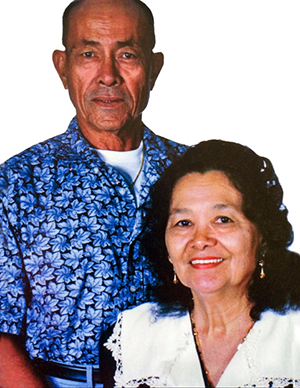Family, love and sacrifice

Ana Blas San Nicolas Gogue (1935 – 2004) was six years old when the Japanese attacked Guam without warning on 8 December 1944. She grew up in rural Sinajana, in an area known as Dedigue. The area is adjacent to Hagåtña, Mongmong, and Ordot, and is perfect for growing crops and raising livestock. Gogue was the second oldest of four siblings at the start of the war.
At the time of the attack, Gogue recalled there were Japanese warplanes flying all around, dropping bombs and firing machine guns — loud explosions could be heard throughout.
Hid in a bamboo patch
Fearing for their lives her father, Joaquin Castro San Nicolas (Familian Nungi-Assan), told his wife, Esperanza Blas (Familian Eka) San Nicolas to take their children and hide in a bamboo patch. The family hid for several hours and after it was safe, emerged from their hiding place. Confused and scared, the family was not aware at the time that the attack coincided with the attack on Pearl Harbor and propelled the United States into World War II against Japan. The San Nicolas’s quiet rural lifestyle was changed from that moment forward.
The Japanese soldiers eventually made their way into Dedigue and took an accounting of the families in the area while searching for provisions. Gogue’s family provided chickens, pigs, and other crops typical to Guam during that period. Gogue and her older sister would oftentimes be the family’s representatives in gathering and providing the Japanese soldiers with the chickens and crops. The Japanese would make recurring visits, again searching for provisions.
Later in the war, the San Nicolas’s—just like many local families—were also forced to march from their home to Manenggon when the Japanese were anticipating that a US invasion and retaking of the island was imminent. Gogue recalled the families had to go out and look for their provisions and oftentimes had very little to eat.
But, their spirits remained high as they had faith that the Americans would return to retake the island. You couldn’t talk openly about the Americans returning but just thinking about it provided Gogue, her family, and many families the hope they all needed to make it through the hardships of war and occupation. So as the liberation of Guam began on 21 July 1944 talk of “Matto tåti i Americano” was a common amongst her family.
Strong sense of pride and patriotism
The San Nicolas’s were Catholics and their faith has passed on to their children. Although Gogue witnessed war at a very early age, through her faith she learned to forgive the Japanese. She and her husband, Agustin Santos Gogue, taught their children forgiveness and the strength and love of the family.
While raising her family in Sinajana, Gogue would often sing, “Sam, Sam, My Dear Uncle Sam,” with a big smile. She told her children the story of the song and the hope it kept alive that the Americans would come back and liberate the island.
Gogue’s life-changing experience from the war was replaced by a sense of pride and patriotism after the Liberation. The Liberation Day parade, in particular, was a special celebration for her. Seeing the military people marching in the parade brought her much joy, as it still does to her descendants.
Editor’s note: Reprinted and adapted, with permission, from Guam War Survivors Memorial Foundation by Adrian San Nicolas Gogue.
